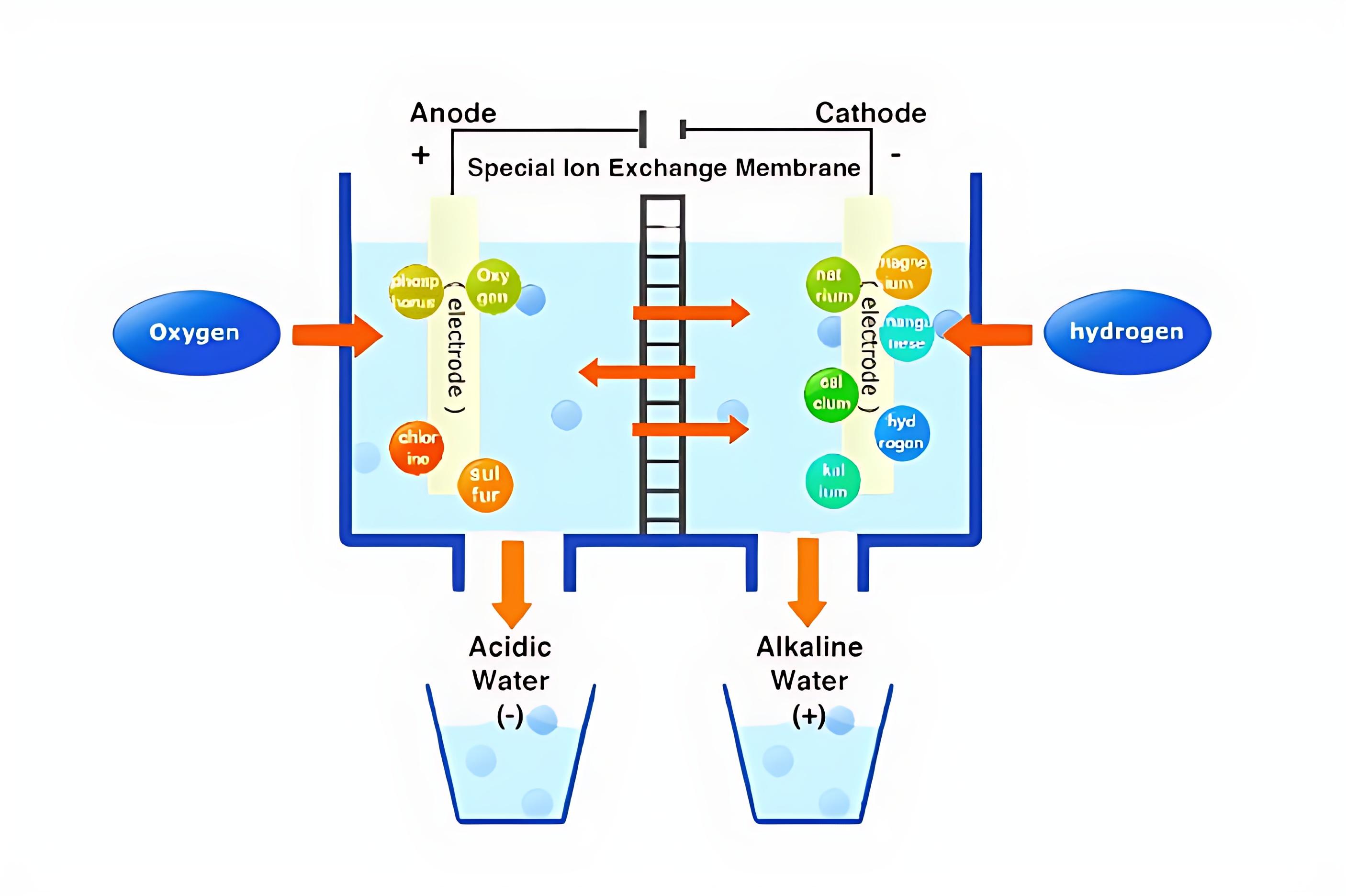
TECHNOLOGY USED IN APSA IONIZERS
Electrolysis is a process that uses electrical energy to drive a chemical reaction, typically involving the decomposition of water into its constituent elements—hydrogen and oxygen. In the context of water ionizers, electrolysis is used to separate water into alkaline and acidic components.
- Electrolysis Chamber
- Application of Electrical Current
- Separation of Ionized Water
Method of Electrolysis in Water Ionizers
1. Electrolysis Chamber:
• The filtered water is then directed into the electrolysis chamber, which contains positively charged electrodes (anodes) and negatively charged electrodes (cathodes). These electrodes are made of platinum or titanium, which are corrosion-resistant and enhance conductivity.
2. Application of Electrical Current:
An electrical current is applied to the electrodes, causing a chemical reaction at their surface.
At the cathode (negative electrode), reduction occurs, forming hydroxide ions (OH-) and hydrogen gas. The water becomes alkaline at this electrode.
At the anode (positive electrode), oxidation occurs, forming hydrogen ions (H+) and oxygen gas. The water becomes acidic at this electrode.
3. Separation of ionized Water:
• The ionized water is then collected from the chamber. The water on the cathode side is alkaline and rich in minerals, while the water on the anode side is acidic and may contain oxidizing properties.
4. pH Adjustment and Mineralization (Optional):
• APSA advanced ionizers allow users to adjust the pH level of the output water. Additionally, they may include mineralization features to add beneficial minerals back into the alkaline water, enhancing its health benefits.
Key Points to Remember
Safety: The electrolysis process is generally safe and does not introduce harmful chemicals into the water.
Efficiency: The efficiency of the electrolysis process depends on the quality of the electrodes, the purity of the water, and the electrical current applied.
Maintenance: There is no maintenance cost for this machine, it is designed so that you can auto-service it by pressing the auto-cleaning and deep-cleaning buttons.
Overall, electrolysis is a critical technology in water ionizers, enabling the transformation of filtered water into healthy alkaline water that is believed to offer various health benefits.

WHY PLATINUM?
Platinum is a precious metal with unique properties that make it highly valuable in various applications, including the production of water ionizers. Platinum offers numerous benefits in water ionizers, including excellent electrical conductivity, corrosion resistance, biocompatibility, and stability. These properties contribute to the ionization process's efficiency, durability, and safety, making platinum a preferred material for manufacturing electrodes in water ionizers.
- 100% Better Results
WHY TITANIUM?
Due to its unique properties and benefits, titanium is a widely used material in various industries, including the production of water ionizers. Here are some of the key benefits of titanium, especially in the context of water ionizers.
Titanium is highly resistant to corrosion, which makes it ideal for use in water ionizers that come into contact with water and various minerals. This property ensures a longer lifespan for the electrodes and reduces the need for frequent replacement
Titanium is known for its strength and durability. It can withstand harsh conditions, including extreme temperatures and varying pH levels, making it suitable for long-term use in water ionization.
Titanium is biocompatible, meaning it is non-toxic and does not cause adverse reactions when in contact
with living tissues. This is particularly important for products related to health and wellness, such as water ionizers While titanium is not as conductive as metals like copper or silver, its conductivity can be enhanced by
applying coatings (such as platinum) during the manufacturing process. This allows for effective electrolysis while maintaining the advantages of titanium. Titanium is significantly lighter than many other metals, making it easier to handle and install in various applications, including portable water ionizers
Overall, the use of titanium in water ionizers offers significant advantages, including corrosion resistance, durability, biocompatibility, and enhanced conductivity when coated. These properties contribute to the efficiency and longevity of water ionizers, making titanium a preferred material for manufacturing electrodes and components in these devices.








